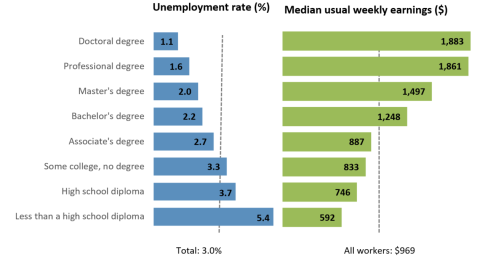USNH Employees – Earn Your Masters Degree from the Carsey School for Free!
Employment within the University System of New Hampshire (USNH) offers benefits beyond the beautiful campus, comprehensive healthcare, and retirement planning. As a USNH employee, you are also eligible to receive outstanding tuition benefits as well. You can receive up to a 100 percent discount on tuition costs for credit-bearing courses, up to a 50 percent discount for non-credit courses, and your spouse and children are eligible for up to a 50 percent discount on current in-state tuition.
Attention USNH Employees: A 100% discount on credited courses is calling your name!
What are some of the tuition benefits available to USNH employees?
- 100 percent of registration fees and tuition costs for Credit Courses.
- 50 percent of registration fees and tuition costs for Non-Credit Courses
- 50 percent of Current In-State Tuition for Credit Coursework Only, available to Employee Spouses/Dependents
When are these benefits available to USNH employees?
Generally, following the 6-month Staff introductory period, the 1-year introductory period for Extension Educator, or the completion of 2 semesters for Faculty.
Additionally, the employee benefit is for courses, not credit hours. Total courses covered by tuition benefit for full-time employees is 5 per fiscal year. Learn more online.
As a USNH/University of New Hampshire (UNH) employee, you can save thousands of dollars on education financing by taking advantage of this tuition benefit. At the Carsey School of Public Policy, we offer master’s degree programs that closely fit with the public service work that you’re doing right now. In addition to directly implementing what you learn in the classroom within your day-to-day tasks and leveraging your newly earned master’s degree towards advancement at USNH, you can apply the capstone portion of the degree program toward projects at your work.
So, what are some other reasons you should earn a graduate degree as a USNH employee?
Networking
The conventional wisdom is true: networking can help you advance in the workplace and secure new job opportunities. According to a new survey by LinkedIn, “85 percent of all jobs are filled via networking.” And earning a master’s degree can help you build your professional network.
The article How To Network In Graduate School by Cheeky Scientist suggests that graduate students should “treat networking like a second job” by setting aside time to connect with as many people their fields as possible. The more that you prioritize networking, the better results it will have on your career.
Megan Brabec ('13, '19G) earned her Master of Public Administration degree from the Carsey School while serving as the Coordinator of Civic & Community Engagement with the Civic and Community Engagement team at the University of New Hampshire. Megan notes that participating in the program allowed her to meet people doing great work across the state. For anyone considering a master’s degree, she advises them to be intentional about the electives they choose and learn all that they can from faculty and from classmates.
Earning your master’s degree can offer a myriad of networking opportunities as well. In fact, Indeed ranks networking as one of the top advantages to enrolling in a master’s program. The article identifies classes, internships, and fieldwork all as opportunities for networking found within a master’s program.
Career Advancement & Job Security
Unemployment rates and earnings by educational attainment

Research shows that a master's degree can advance your career at a faster pace than work experience alone. According to Money-Zine, a master's degree can equal up to 10 years of experience. And, with the average master’s degree taking just a year or two to complete, a master’s degree graduate can gain approximately 10 years of experience in one-fifth the time.
An article on MastersProgramsGuide.com offers additional reasons for and advantages of earning a master’s degree, including:
- Increased respect and credibility by employers and potential employers
- Higher earning potential
- And research opportunities
In 2020, it’s not unusual for recent undergraduates to struggle when applying to jobs that require several years of experience or, in exchange, a master’s degree. In fact, the number of jobs that require a master’s degree is growing. A recent survey by Career Builder shows that 38 percent of employers have raised their educational standards in general, and 33 percent of employers are “hiring more workers with master's degrees for positions that had been primarily held by those with a four-year degree.” The same survey speculates that a four-year degree is the new high school diploma, and the master’s degree will soon carry the same value that a bachelor’s degree did a few years ago.
Currently in the U.S, one third of adults are college graduates – a number that was once as small as 4.6 percent in the 1940’s. About 16 million people – or about 8 percent – in the U.S. have master’s degrees, which is 43 percent of master’s degree graduates from 2002. In fact, master’s degrees are as common today as bachelor’s degrees were in the 1960s. And, as the overall value of college degrees decreases due to more members of the U.S. workforce possessing them, those with master’s degrees stand to compete better than those with only four-year degrees.
Flexible Classes for Working Professionals
One of the greatest advantages of earning your master's from the Carsey School of Public Policy is the flexibility to earn your degree at your pace. Especially with USNH’s tuition-free attendance, there's generally less pressure to finish your degree within a given time period. At the Carsey School, all of our graduate programs, the Master of Public Administration (MPA), Master in Community Development (MCD), and Master in Public Policy (MPP), were designed with working professionals in mind.
The MPA and MCD degrees are ideal for working professionals, offering online courses which can be started in the fall, spring, or summer terms. As a student in these programs, you’ll connect with community-based partners and practitioners while gaining the knowledge and leadership experience applicable to careers in public service, nonprofits, and a variety of private sector industries. Students can complete these programs in just 14-16 months while working full-time or take courses at their own pace.
Parker LaRock '20G earned his MCD from Carsey as a USNH employee. Today, he serves as a residence hall director with UNH’s Housing and Residential Life.

“With COVID-19 and the way it impacts so many people in so many different ways, I have been utilizing the tools I developed and learned through my degree to build strong, supportive communities within my residence hall,” says Parker.
The MPP degree at Carsey teaches students the skills needed to create change and make a difference in modern policy making. MPP student and current UNH Assistant Director of Student Engagement, Paul Chiarantona, says that the degree's flexibility has helped him effectively balance education, career, and family.
“I’m a dad of a 15-month-old and I’m a full-time worker, and I don’t always have the time to do two to three classes a semester,” said Paul. “But given the flexibility, a lot of classes are held after hours, which is really amazing and a lot of them offer remote options.”
A master’s degree from the Carsey School of Public Policy offers a path to higher education, networking, and expanded career opportunities. So, are you ready to take advantage of your tuition benefits?
- Learn more about the graduate degree programs at the Carsey School of Public Policy.
- Or Contact the Admissions Team at the Carsey School today!
FAQs
UNH employees must complete their introductory employment period before they can become eligible for the USNH Tuition Benefit. This period ranges from six months for most staff to the completion of two semesters for faculty. Once they’ve completed that period, they can receive:
- 100% coverage of tuition and registration fees for Credit Courses.
- 50% coverage of tuition of registration fees (less cost of course materials and meals, if applicable) for Non-Credit Courses
Eligible UNH employees must complete a Tuition Benefit form request online, which they can do via the USNH WISE system. This request must be submitted for each semester that the benefit is needed for eligible emloyees and their dependents.
USNH employees should contact UNH HR Benefits with questions about using their employee tuition benefits by calling 603-862-0504 or emailing HR.Benefits@unh.edu